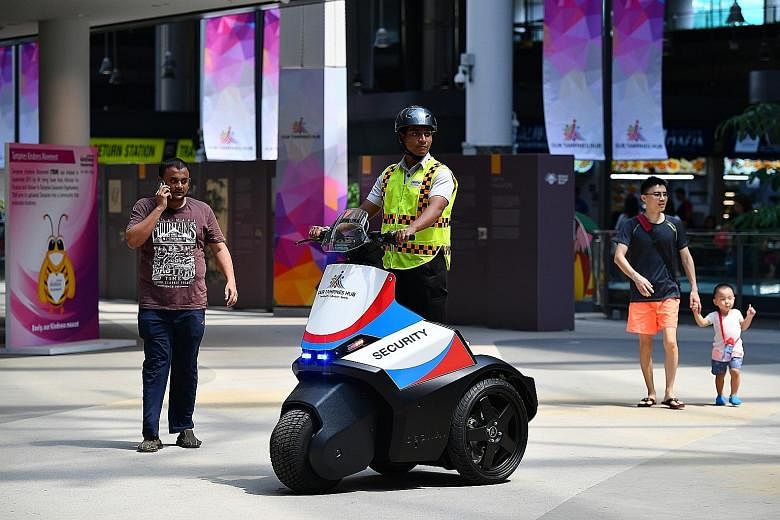Security officers can expect faster promotions while mid-career entrants into the security industry can expect higher pay grades from next year following the Government's endorsement of recommendations from a tripartite workgroup.
A report by the Security Tripartite Cluster (STC) released yesterday also made calls to emphasise skills and competencies by moving towards a skills-based progression criteria. The report was accepted by the Ministry of Home Affairs (MHA) on the same day.
The minimum number of years needed for security officers to rise through the progressive wage model (PWM) ranks will be reduced, with the changes taking effect from next year, said MHA.
In November last year, enhancements were made to the security industry's PWM, which introduced annual increments from 2019 to 2024, and the removal of overtime exemption from 2021.
The PWM, which pegs wage increases to workers' skill and experience levels, was implemented in the security industry in late 2016.
Under the current criteria, security officers need at least one year's experience before they can be promoted to senior security officers. This will be halved to six months.
At present, it takes senior security officers two years before they can be promoted to security supervisors, and another two years to go from that rank to senior security supervisors. Under the updated framework, the minimum period needed to go from senior security officer to security supervisor will be a year.
The minimum period to be promoted from security supervisor to senior security supervisor will also be reduced to 1½ years.
However, the criteria to be promoted from senior security supervisor to chief security officer will remain as two years to reflect the seniority and experience required of the role, said MHA.
Under the PWM, the lowest-ranking security officers will earn at least $1,100 monthly. A senior security officer will get a minimum wage of $1,300, while a higher-ranking senior security supervisor will receive at least $1,700.
The STC's report also suggested helping mid-career entrants join the industry by allowing them to start out at a higher rank. Mid-career entrants with supervisory experience might not find a career switch to the security industry attractive because the current PWM structure requires them to start at the most junior rank of security officer, said the STC.
In response, MHA said a new place-and-train programme for security supervisors will be piloted from January. The six-month programme provides a fast-track pathway for suitable candidates to be appointed as higher-rank security supervisors.
MHA also accepted revised job functions by the STC to provide more clarity and flexibility on security officers' job roles for more effective deployment.
These revised job roles will take effect from Jan 1, and include giving more responsibilities to lower-ranking officers.
NTUC assistant secretary-general Zainal Sapari, who is also chairman of the STC, said the group regularly reviews the security PWM to ensure it remains relevant to the industry.
"We believe the new recommendations will provide greater flexibility to security agencies and better career prospects for security officers, and ultimately pave the way for the industry to be an attractive one offering viable and meaningful careers for workers," he said.


